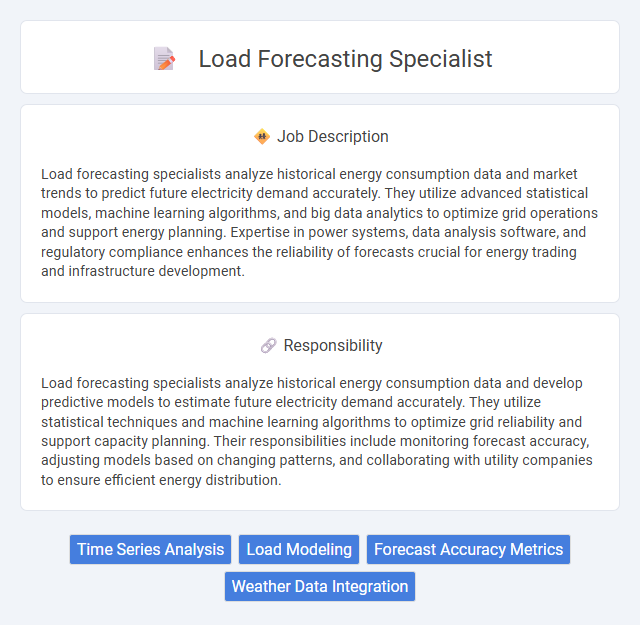
Load forecasting specialists analyze historical energy consumption data and market trends to predict future electricity demand accurately. They utilize advanced statistical models, machine learning algorithms, and big data analytics to optimize grid operations and support energy planning. Expertise in power systems, data analysis software, and regulatory compliance enhances the reliability of forecasts crucial for energy trading and infrastructure development.
Individuals with strong analytical skills and a keen interest in data patterns are likely to be suitable for a load forecasting specialist role, as the job demands accurate prediction of electricity demand. People who thrive under pressure and can handle large datasets with attention to detail will probably perform well in this position. Conversely, those who prefer routine tasks or struggle with complex quantitative analysis may find this job less fitting for their abilities.
Qualification
A Load Forecasting Specialist typically requires a strong background in electrical engineering, data science, or energy economics, with proficiency in statistical modeling and machine learning techniques essential for accurate demand prediction. Advanced skills in software tools such as Python, R, or MATLAB, combined with experience in handling large datasets and time series analysis, are critical for developing reliable load forecasts. Industry certifications like Certified Energy Manager (CEM) or experience with utility grid operations enhance qualifications and employability in this specialized energy sector role.
Responsibility
Load forecasting specialists analyze historical energy consumption data and develop predictive models to estimate future electricity demand accurately. They utilize statistical techniques and machine learning algorithms to optimize grid reliability and support capacity planning. Their responsibilities include monitoring forecast accuracy, adjusting models based on changing patterns, and collaborating with utility companies to ensure efficient energy distribution.
Benefit
Load forecasting specialists are likely to enhance energy management efficiency by predicting future electricity demand with high accuracy. This specialization may reduce operational costs and improve grid reliability, thereby benefiting energy providers and consumers alike. Expertise in load forecasting could also open opportunities for career growth in the evolving renewable energy sector.
Challenge
Load forecasting specialists likely face the challenge of accurately predicting energy demand in the context of fluctuating consumption patterns and integrating renewable energy sources. They probably need to manage uncertainties related to weather variations and economic factors that influence load. Balancing precision with timely forecast delivery could be a consistent difficulty in their role.
Career Advancement
Load forecasting specialists develop predictive models to estimate electric power demand, enabling utility companies to optimize grid operations and energy distribution. Mastery in statistical analysis, machine learning, and domain-specific software tools like Python, R, and MATLAB can accelerate career growth, leading to roles such as senior analyst, energy consultant, or grid optimization manager. Continuous skill enhancement in emerging technologies like AI-driven forecasting and renewable integration significantly boosts opportunities for leadership positions within energy companies and consulting firms.
Key Terms
Time Series Analysis
Load forecasting specialists use advanced time series analysis techniques to predict electrical demand patterns, leveraging historical consumption data and environmental factors. Their expertise in ARIMA, SARIMA, and machine learning models enables accurate short-term and long-term load predictions, which are crucial for optimizing energy generation and grid stability. Proficiency in statistical software such as R, Python, and MATLAB enhances their ability to model seasonal variations and improve forecast reliability.
Load Modeling
Load forecasting specialists develop and refine load models to predict electricity demand accurately at various time intervals, using statistical analysis and machine learning techniques. Their expertise in load modeling enables utilities to optimize grid operations, manage energy resources efficiently, and reduce operational costs. Proficiency in tools such as Python, R, and advanced time series analysis is critical for enhancing forecasting precision and reliability.
Forecast Accuracy Metrics
A Load Forecasting Specialist monitors and improves forecast accuracy metrics such as Mean Absolute Percentage Error (MAPE), Root Mean Square Error (RMSE), and Mean Bias Error (MBE) to ensure precise energy demand predictions. They analyze historical load data and external factors like weather patterns to enhance the reliability of short-term, medium-term, and long-term load forecasts. By optimizing these metrics, the specialist supports grid stability and efficient energy resource planning.
Weather Data Integration
A Load Forecasting Specialist with expertise in Weather Data Integration utilizes meteorological data to enhance the accuracy of electricity demand predictions. By analyzing temperature, humidity, wind speed, and solar radiation, they develop models that adjust load forecasts in real-time, ensuring grid reliability and optimizing energy resource allocation. Their role involves collaborating with data scientists and utility operators to incorporate advanced weather analytics into forecasting algorithms, improving operational efficiency and reducing costs.
 kuljobs.com
kuljobs.com